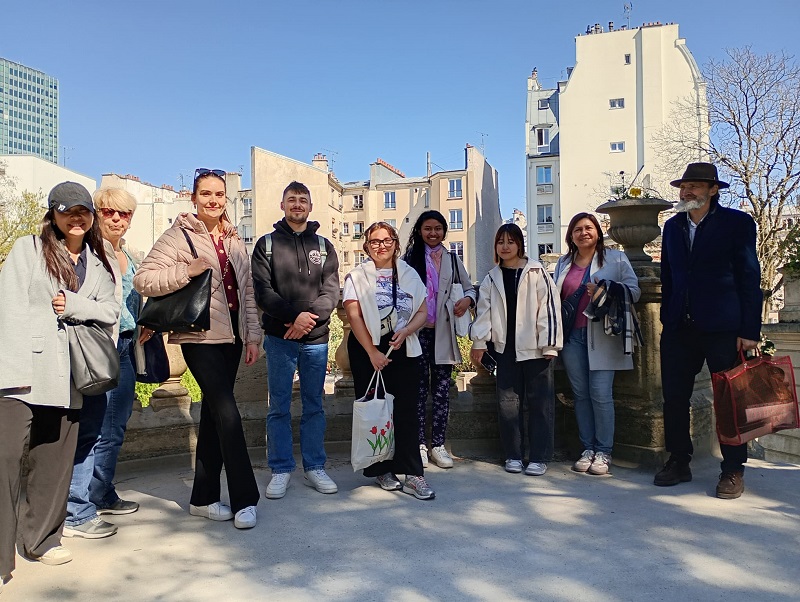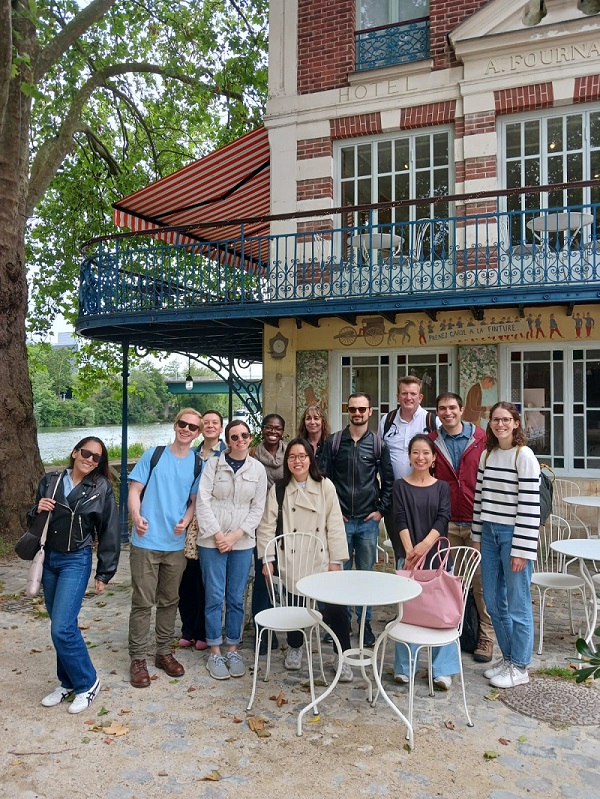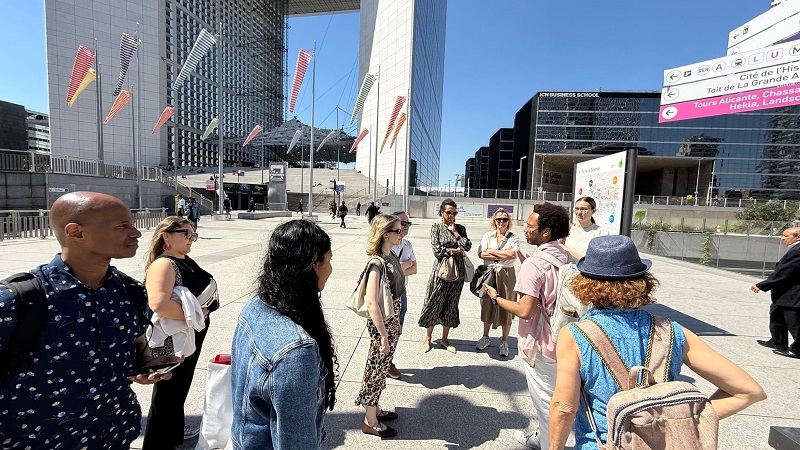Do you dream of enrolling in a university or a grande école in France and experiencing the high standard of French higher education?
Located in the heart of Paris, École Suisse has been supporting international students in achieving their academic goals for nearly 100 years. Specialising in French as a Foreign Language (FLE), our school offers tailored programmes for all levels (A1 to C1, aligned with the CEFR). These include dedicated tracks that prepare students efficiently for official exams like the DELF and DALF, often required for admission to French higher education institutions.

Why Study in France as an International Student?
Every year, France attracts thousands of international students from around the world. In 2024 alone, almost 500,000 students were drawn by the quality of its higher education and its rich cultural heritage. Many recognise the excellence of French education, especially in fields like science, arts, law, and business.
Beyond academic prestige, studying in France immerses you in a globally renowned culture—gastronomy, art de vivre, and historic landmarks. Choosing to study here means experiencing life “à la française” while elevating your French language skills.

What are the Types of Institutions for International Students?
French Universities
French universities welcome a large number of international students. They are easily accessible and offer programmes in almost every field—Bachelor’s, Master’s, or Ph.D. degrees. French university degrees enjoy global recognition, making them ideal for bolstering your academic background abroad.
Grandes Écoles
French grandes écoles are prestigious private institutions—such as business schools, engineering schools, or specialised institutions like Sciences Po for journalism. These schools are highly selective with limited spots, offering elite-level education.
BTS and Technical Training
France also offers professional programmes such as the BTS (Brevet de Technicien Supérieur), accessible to international students. These programmes often include internships, offering a practical bridge between theory and professional integration — either in France or in your home country.

Admission Requirements for Studying in France as an International Student
Admission criteria for French higher education vary by institution, but most require:
- Transcripts from prior education
- Diplomas translated into French
- One or more letters of recommendation
- Passing an admissions test or specific evaluation
- Attending a motivational interview
- Submitting a recognised French language test
French language proficiency is essential for international students—even for programs taught in English. Most courses require an intermediate to advanced level of French. It enhances both your academic performance and your integration into your daily life in France.
Accepted French Language Tests
Accepted tests include:
- DELF – widely recognised internationally. Required level: usually DELF B2
- DALF C1 – for advanced-level proof; often required for selective programmes like grandes écoles or specialized Master’s
- Other accepted certificates: TCF (Test de Connaissance du Français), TEF (Test d’Évaluation du Français)
The DELF Exam – Official French Language Certification
The DELF (Diplôme d’Études en Langue Française) is an internationally recognized official French language exam designed for beginner to intermediate learners of French. It is one of the most common French certifications required for non-native speakers. If you're planning to study in France, most universities and higher education institutions require the DELF B2 level, in accordance with the Common European Framework of Reference for Languages (CEFR).
The DALF Exam – Advanced French Proficiency Test
The DALF C1 (Diplôme Approfondi de Langue Française) is also an internationally recognized official French language test, but unlike the DELF, the DALF is intended for advanced speakers. It assesses high-level French proficiency (levels C1 and C2 on the CEFR scale). Passing the DALF C1 exam demonstrates excellent command of the French language in academic, professional, and everyday contexts. It is often required for admission into selective programs such as elite French “grandes écoles” or specialized Master’s degrees.
Other Accepted French Language Tests for Studying in France
In addition to the DELF and DALF, there are other recognised French language proficiency tests accepted by French institutions, including:
- TCF (Test de Connaissance du Français) – a general test of French language knowledge;
- TEF (Test d’Évaluation du Français) – often used for academic and immigration purposes.
Comparative table of French language tests
| Test | French Proficiency Levels | Validity | Recognition | Format |
|---|---|---|---|---|
|
DELF |
A1 to B2 | Lifetime |
Recognized worldwide; often required for university admission in France (B2 level) |
Written + Oral exams |
| DALF Diplôme Approfondi de Langue Française |
C1 to C2 | Lifetime |
Internationally recognized; required by some top-tier schools and specialized Master’s programs |
Written + Oral exams |
| TCF Test de Connaissance du Français |
A1 to C2 | 2 years | Accepted for Campus France registration and student visa applications |
Multiple-choice (MCQ) + Written and Oral expression |
| TEF Test d’Évaluation du Français |
A1 to C2 | 2 years | Valid for applying to undergraduate programs in France |
Multiple-choice (MCQ) + Additional written/oral sections |
At L’École Suisse Internationale, we offer tailor-made programs to help you prepare for the official French language exams.
► FIND OUT MORE ABOUT OUR DELF/DALF PREPARATION PROGRAMMES
Steps to Study in France as an International Student
If you're an international student aiming to study in France, it's important to start the application process several months before the academic year begins. Admissions typically open as early as January for a September intake.
Here are the 3 key steps to prepare your application:
1. Validate Your French Language Level
You can choose to register directly for the test of your choice (DELF, DALF, TCF, or TEF), or you may prefer to take French preparation courses to boost your skills and aim for a B2 or C1 level.
2. Register on Campus France
Campus France is the official platform for submitting applications to French higher education institutions. You’ll need to upload your diplomas, transcripts, and language proficiency certificates.
3. Apply for Your Student Visa
Once admitted, you must apply for a student visa through the French consulate in your home country. The VLS-TS (Long Stay Visa Serving as Residence Permit) allows you to study and live legally in France.
Study Smart: Join Our French Exam Preparation Courses in Paris
Most French universities require proof of language proficiency. Not confident in your level? Our intensive French language courses can help you succeed!
At L’École Suisse Internationale, we welcome students year-round at our school in the heart of the 10th arrondissement in Paris. Our programs are custom-designed for success on the DELF and DALF exams, available in small groups or one-on-one sessions.
You’ll benefit from our experienced, certified teaching team, dedicated to supporting your progress every step of the way.
Online French Courses Also Available
Can’t travel to Paris? We also offer online courses to help you prepare for the DELF and DALF exams from anywhere in the world.
Why Choose Our French Exam Preparation Programs?
✅ Friendly atmosphere and personalized support
✅ Methods adapted for all levels (A1 to C2)
✅ Includes general French courses + targeted exam training
They took our DELF/DALF exam preparation courses
Jan
![]() Very good experience:
Very good experience:
- Very good value for money
- Small groups
- Many different and very good teachers
- Very helpful office staff
- Friendly and family-like atmosphere
- Weekly cultural excursions
- Support with my master's application (help with motivation letter, CV, etc.)
From September last year until March, I attended École Suisse to learn French. My goal was to reach a B2 level so I could start a master’s program in Paris in September of this year. I had heard about different language schools through Facebook and decided to write to them one by one. The École Suisse office responded to my questions quickly and in detail, and I was able to visit the school that same week to have a look around. During that visit, I also took a written test and had a longer conversation with Thierry to determine my current level.
During the six months I was able to attend this school, I was never in a class with more than eight people. Usually, we were four to six per class. The teachers changed every day. As a student, I benefited from the many different teaching approaches used by the teachers, each with their own style and all very good. Overall, École Suisse places great importance on the practical use of what is learned. The necessary grammar is directly applied in oral exercises, and students are generally encouraged to speak a lot in class. You learn the most by speaking a lot and asking the teachers to point out your mistakes. In addition to grammar, you also learn topic-specific vocabulary through exercises, read French texts together and discuss them, listen to radio reports and answer comprehension questions, and are given writing assignments. École Suisse provides suitable and useful study materials for every language level. I found it amazing how quickly we were able to read and understand full texts together in class.
My classmates came from all over the world and from all age groups, and through the many discussions and conversations both in and outside of class, we got to know each other very well. What makes École Suisse special is the large common room. All students and teachers gather there during the morning coffee break.
It feels like you're chatting at a party. The initial shyness everyone feels about speaking French usually disappears on the first day. You quickly start speaking French with others and improve your skills outside of class. I especially enjoyed lunch at the school. Everyone brings something to eat, and then we all sit together at the big table and have various conversations with the teachers and classmates. You’ll be surprised at what you’re already able to talk about in French and what you suddenly understand. This friendly and family-like environment is also supported by the weekly cultural outings every Wednesday.
Of course, we don’t go to the Eiffel Tower or other overly touristy places—but to the real Paris, thank you very much. When the weather is nice, we walk through the city together and discover places like the covered passages or the Coulée Verte. When the weather is bad, we visit exhibitions and various studios together.
At École Suisse, I also received valuable support for my master's application. From the beginning, I was able to talk with the teachers about different universities, and they made me aware of the very early application deadlines. When I finally started preparing my application, I met almost daily with Véronique, with whom I wrote my first motivation letter and translated my CV. (April 2023)
Ready to Study at a French University but Worried About Your French Level?
Start your success journey now with our intensive French courses in Paris.
FAQ: How to Get Into a French University as an International Student
What level of French is required to study in France?
Most universities require a B2 level, while top institutions or grandes écoles may demand C1.
Which test should I take to prove my French level?
The DELF (for intermediate learners) and DALF (for advanced learners) are the most widely accepted exams. They’re valid for life and recognized worldwide.
How long does it take to get a student visa for France?
It typically takes 8 to 12 weeks. You’ll need:
- A valid passport
- Proof of admission to a French school
- Recent diplomas or transcripts
- Proof of financial means
- Accommodation confirmation
- Health insurance
What’s the difference between a university and a grande école?
Universities offer broader, general programs.
Grandes écoles are more specialized and selective.
Where can I take my French language test?
The DELF and DALF exams are offered several times per year at authorized test centers worldwide. Find a center near you.
Can I study in France as an international student without speaking French?
Some programs are taught entirely in English. However, most higher education courses are in French, and strong language skills are key to both academic success and cultural integration.
How long does it take to reach B2 in French?
If you're a complete beginner, an intensive immersion course can help you reach B2 level in 8 to 12 months, with consistent personal study alongside classes.
Why take a preparation course for the DELF exam?
Preparation courses not only help you progress in all areas of French (speaking, writing, listening, reading) but also train you in the exam methodology, which can boost your score significantly. Our experienced teachers are experts in exam strategies and know what it takes to succeed.